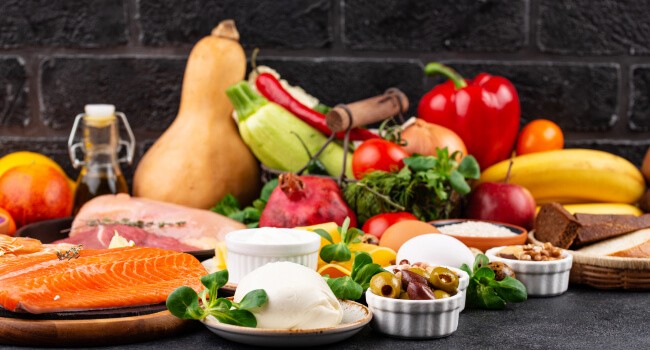Highlights
- Holiday depression is not a diagnosed mental condition but rather a term for an emotional dip and anxiety during the December holidays.
- Holiday depression, holiday blues, Christmas depression, and Christmas blues are all names for the same term.
- Financial and personal stress, family conflicts, and loneliness are common triggers of holiday depression.
- If your holiday depression lasts more than two weeks or affects your daily functioning, you should consult a healthcare provider.
While the lights twinkle, colorful festivities and the joyful buzz of Christmas are everywhere, some people silently battle holiday sadness. It goes by many names, like holiday depression, Christmas depression, Christmas blues, or holiday blues. Still, the essence is always the same: an emotional struggle caused by unmet expectations, negative memories or experiences, and increased stress.
In this article, we discuss why holidays can be depressing for some, as well as ways to cope with it.
What Is Holiday Depression?
Holiday depression or holiday blues is a term used to describe an emotional upset that can happen during the holiday season; it is not an official mental illness.
The Impact of Holidays on Mental Health
While the holiday season is a fulfilling and happy time for some, others find it challenging. Personal experiences around Christmas vary and might cause anxiety and sadness because of:
- Stressful circumstances
- Unpleasant family dynamics
- Difficult financial situations
- High stress levels at work or another life area
Nearly
In 2014, the
Let’s have a closer look at holiday depression and how it differs from diagnosed mental illnesses.
Signs and Symptoms of Holiday Depression or Holiday Blues
Some of the symptoms of holiday blues to look out for include:
- Sadness or low mood
- Irritability
- Difficulty concentrating
- Feelings of remorse or guilt
- Isolation and withdrawal
- Fatigue
- Changes in sleep patterns
- Changes in appetite
- Increased substance usage
- Physical symptoms like unexplained headaches and stomach aches
On the surface, the symptoms of holiday depression syndrome overlap with those of
- Holiday blues are not as severe as MDD.
- Holiday blues generally last less than two weeks; MDD is present for at least two weeks.
- Holiday blues do not cause poor social and work functioning.
In other words, holiday blues is mild and short-lived.
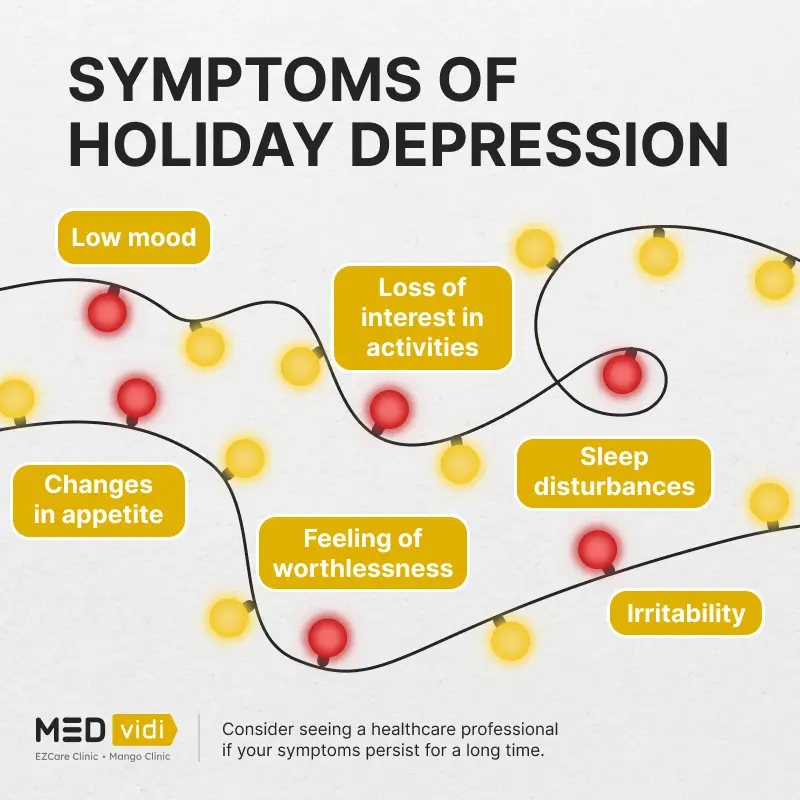
Holiday Blues vs Seasonal Affective Disorder
SAD occurs in the fall and winter because there is less sunlight.
On the other hand, holiday blues usually occur due to circumstances, not lack of sunshine. Importantly, holiday depression is not a mental illness and passes during or after the holidays.
Why Do People Get Depressed Around the Holidays?
There might be several reasons why people feel sad during the holidays. Let’s look at a few of the most common ones.
Loneliness at Christmas
The reality of our world is that families are often spread across the country or even around the globe. For those who are away from friends and family and feel alone, there is a risk of having Christmas depression.
Past Trauma or Loss
Sometimes, unexpected terrible things happen around the festive season, like death or another tragic event. In this case, holiday sadness may resurface each year around the same time, and it’s important to learn how to cope with the consequences of traumatic experiences.
Financial Stress
The temptation to spend money on gifts, vacations, and other holiday-related expenses can cause stress and financial strain.
Unrealistic Expectations
Increased stress and disappointment can result from unrealistic expectations for the “perfect” holiday, family get-togethers, or present-giving.
Family Conflicts
Some family dynamics are complicated. Spending time with family during the holidays might not be enjoyable if there are unresolved issues or strained relationships.
Social Comparisons
Feelings of inadequacy or dissatisfaction can arise when someone compares their life to perceived ideals portrayed in the media or by others.
Increased Demands
Holiday planning, parties, excessive drinking, and social commitments can strain limited resources and emotional health.
Pressure to Be Happy
For some, it’s challenging to overcome the pressure of expected holiday cheer, and they feel anxious and depressed at holiday times.
Self-Reflection
At the end of the year, people often take stock of their lives, examining their achievements and failures. Sometimes, unmet goals result in feelings of disappointment and low self-esteem.
Religious Reasons
About
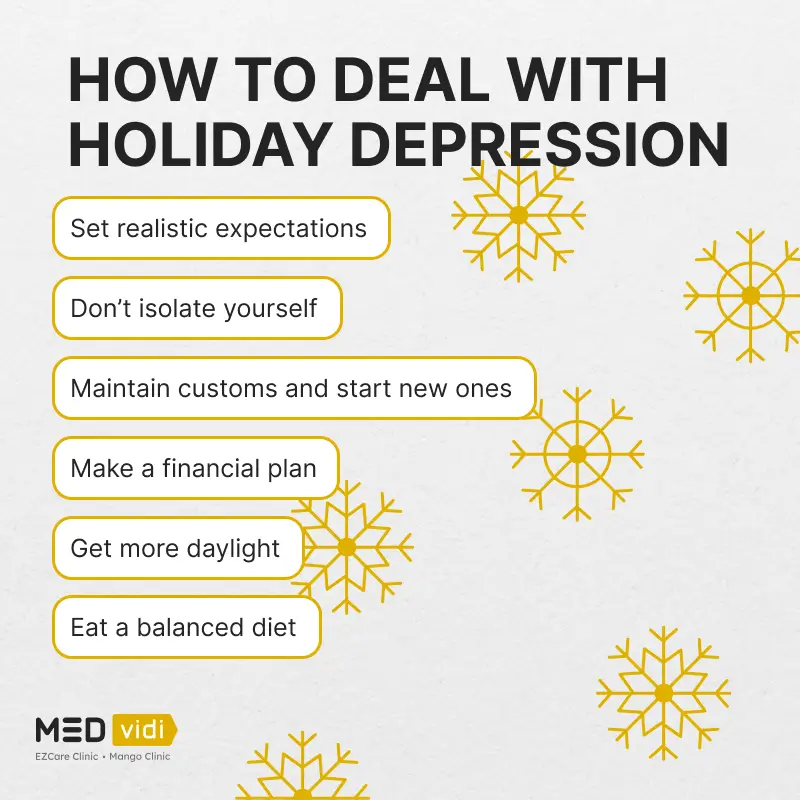
How to Deal With Holiday Depression
If you experience negative emotions during the holidays due to any of the causes discussed earlier in this article, the techniques below may help you to cope with holiday blues.
Nurture Social Bonds
- Participate in social gatherings.
- Initiate gatherings with family and friends.
- Avoid excessive alcohol as it exacerbates the blues.
Start Financial Planning Early
- Establish a spending plan for the holidays.
- Concentrate on giving thoughtful, reasonably priced gifts — gift-giving is not only about money. For example, organize a ‘Secret Santa’ where everyone attending the celebration receives only one gift from another randomly selected person. This means that at a celebration of 10 people, each person only buys one present instead of 10.
- Look into low-cost or homemade holiday decorations.
- Find free things to do in the holidays, like attending Christmas markets and art galleries, walking around town looking at the Christmas lights, or window shopping.
Organize Yourself
- Budget your spending and know when to stop.
- Make lists to prioritize tasks.
Try to Reduce Stress From Gatherings
- Delegate tasks equally before getting together.
- Establish personal boundaries before gatherings.
- Have frank discussions in advance to set expectations and avoid possible conflict.
Get as Much Daylight as Possible
Avoid Social Comparisons
- Set realistic expectations of what you can achieve; for example, don’t offer to host a Christmas dinner for 20 people if you feel like it’s going to be overwhelming in your loft apartment.
- Put self-care first and be honest about your boundaries long before the event.
- Concentrate on the things that make you happy and fulfilled.
- Start customs that give the holidays joy and significance to you.
Take Care of Yourself
This is your holiday break; use it to relax and do things you love. At times, prioritize yourself above others to start the new year rested and fresh.
- Feel free to skip the celebration if it doesn’t feel right.
- Maintain the traditions you are used to.
- Seek support from loved ones by telling them exactly how they can help you.
- Seek professional help if these feelings overwhelm you.
Prioritize your mental wellness
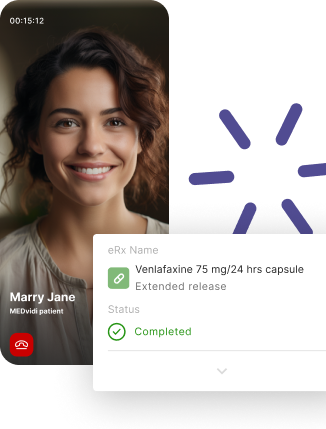
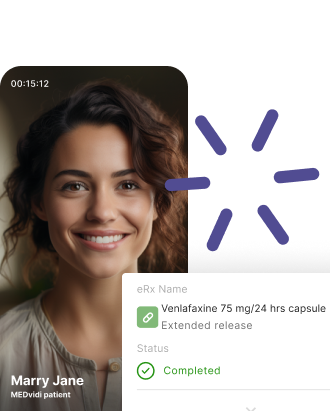
How Do You Help Someone Who Is Sad During the Holidays?
If someone is quiet, withdrawn, or tearful, they might have depression during the holidays. Let them know you support them while not forcing them to participate in celebrations if they don’t want to.
Be aware that even if you are financially stable, others might not be. So, take the initiative to suggest cost-cutting ideas for Christmas.
But what if you’re the one battling the Christmas blues?
When and Where to Seek Help for Depression
Depression around the holidays can be a normal reaction to life circumstances; however, you need to seek help from a mental health professional to assess your mental well-being in the following circumstances:
- Your emotions interfere with your relationships, career, or day-to-day functioning.
- The sadness extends beyond the holiday season for more than two weeks.
- You have ideas of self-harm or suicide.
You can consult a primary care physician, a psychologist, a psychiatrist, a psychiatric nurse, or a licensed clinical social worker to go through an evaluation and get a diagnosis or organize a referral. Your healthcare provider will decide on a personalized treatment plan for depression that may include antidepressant medications, talk therapy, or both.
If you’re experiencing suicidal or self-harming thoughts and require immediate assistance, contact a crisis hotline, such as 911, 988 suicide & crisis lifeline (toll-free), or Samaritans (116-123 or via chat).
In Conclusion
You might feel low-grade anxiety and depression at Christmas for many reasons. Cultivating empathy for others, openly communicating with loved ones, and not financially overextending yourself is essential in overcoming these holiday blues.
Watch your mood closely as you move into January; when the celebrations are over, and the blues are still there, it is a common time for clinical depression to set in. At any point, if you are feeling confused about your emotions, a professional opinion and help are available online at MEDvidi. Take care of yourself to go through holidays and any other seasons calmly and confidently.
Frequently Asked Questions
Is it okay to be sad at Christmas?
It is normal to feel sadness during the Christmas season. It may happen because of social, financial, and many other factors. Holiday blues normally fade away when holidays end, but if these feelings remain for longer, consider seeing a healthcare professional.
What do you do if you have the Christmas blues?
Seek assistance from friends and family, take care of yourself, and make sure your expectations from the holiday season are reasonable. Remember to see a healthcare professional if the symptoms become prolonged or unbearable.
Can holidays make your depression worse?
According to NAMI, holidays can make mental health disorders worse, including clinical depression. However, this is not always the case, and some people with depression may not experience the aggravation of symptoms.
Is there such a thing as holiday anxiety?
Holiday anxiety is a real phenomenon defined as increased stress and uneasiness during the holidays. It can be connected to a number of things, including family get-togethers, financial difficulty, and social obligations.
How can I ease my holiday anxiety and depression?
Make sure you’ve set realistic expectations for the holiday season, prioritize joyful activities and self-care, and think about getting professional help if anxiety and depression overwhelm you.
What is the blue mood after a holiday?
The “blue mood” following a holiday, often known as the “post-holiday blues,” is characterized by depressive or negative ideas when the celebrations end. It’s a common happening, and organizing fun activities and practicing self-care can make the shift to routine easier.
Why are the holidays hard on mental health?
Different stressors, such as family gatherings, societal expectations, financial hardship, and the emphasis on holiday cheer and joy — which may conflict with personal feelings or experiences — can affect mental health during the holidays.






